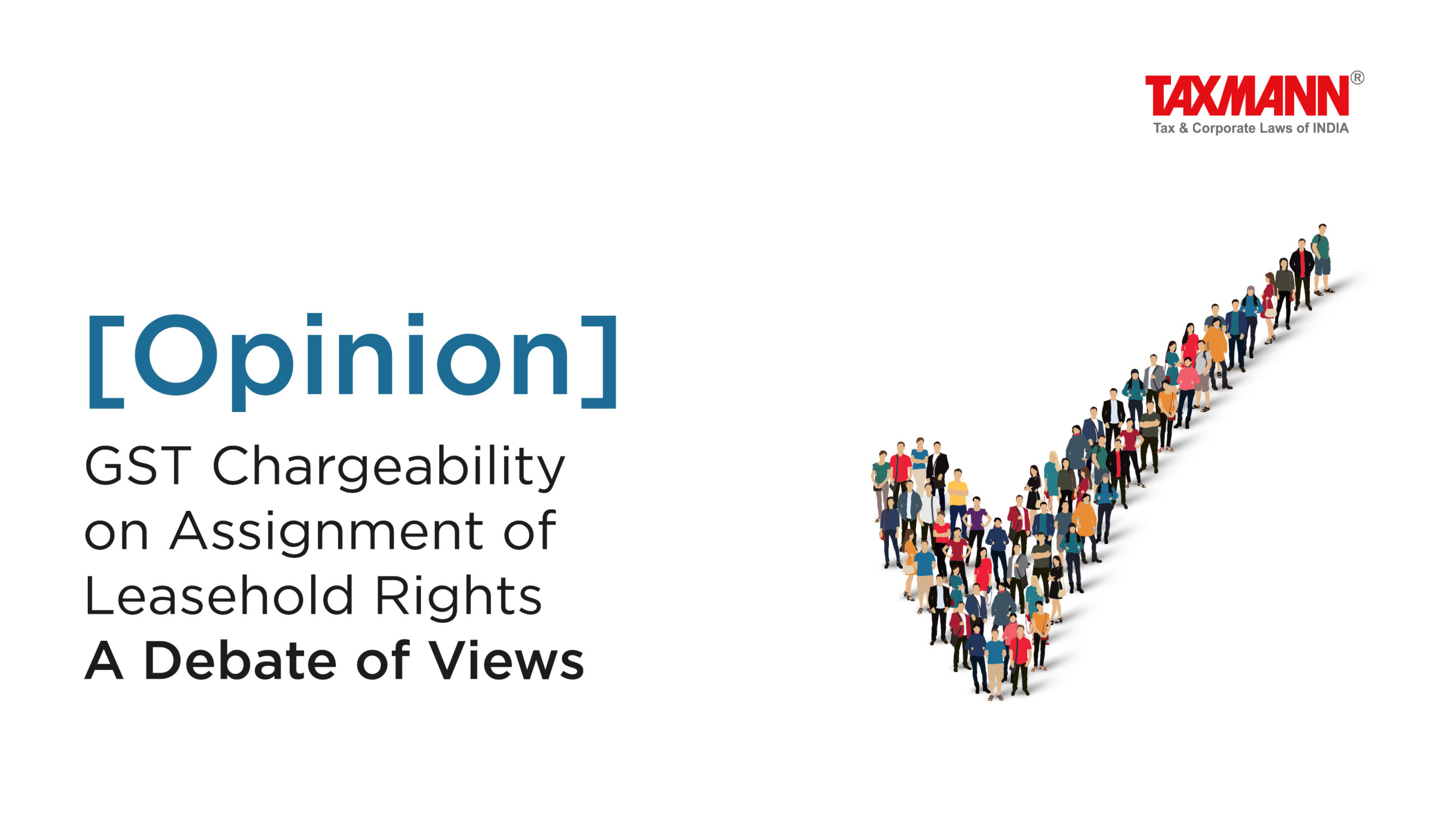[Opinion] GST Chargeability on Assignment of Leasehold Rights | A Debate of Views
- Blog|News|GST & Customs|
- 3 Min Read
- By Taxmann
- |
- Last Updated on 19 August, 2023

Rajat Dosi – [2023] 153 taxmann.com 331 (Article)
Introduction
The applicability of Goods and Services Tax (GST) on the assignment or transfer of long-term leasehold rights has been a subject of debate in India for quite some time. The significance of this issue arises from the fact that in India, a significant portion of land, industrial, commercial, or residential, is leased by Government bodies such as GIDC, HSIDC, RIICO, DDA, etc., to the allottees on a long-term basis (99 years or 50 years). For grant of such lease the allottees usually pay a onetime premium (also commercially known as salami) and annual lease charges. Such lease transactions grant the allottees the right to use the land for an extended/long period, often spanning 99 years. Over time, these allottees either retain the land for their own use or opt to sell or assign it to other individuals, usually at a profit, for the remainder duration of the original lease period (commercially known as ‘assignment of leasehold rights’).
The question of GST applicability on assignment of leasehold rights has been looming for a long period of time without any concrete conclusions. While some interpret it as a ‘supply of service’ and subject to GST, others argue that it qualifies as ‘sale of land’ or ‘deemed sale’, exempting it from GST. In this article, we will explore both perspectives, taking into account the relevant legal provisions, CBIC Circulars, Advance Rulings, and consider the implications under land laws and the Income Tax Act.
View I – GST is Payable
Proponents of this view rely on the following arguments:
1. Relevant Legal Provisions:
1.1. Section 7 of the CGST Act, which is the charging section, encompasses all supplies of goods and services, including lease and rental activities, making them subject to GST.
1.2. Schedule II of the CGST Act deems lease or rental of land or immovable property as a ‘supply of services’, attracting GST. This Schedule also deems ‘agreeing to do an act’ as a ‘supply of service’, attracting GST.
2. CBIC Circular:
2.1. CBIC Circular No. 44/18/2018-CGST clarifies that the assignment or transfer of leasehold rights is indeed a ‘supply of service’ subject to GST payment.
2.2. The circular emphasizes that registration requirements and stamp duty payments do not exempt these transactions from GST liability. It also clearly states that these transactions do not qualify as ‘sale of land’ under Schedule III to the CGST Act (which entails transactions on which no GST is applicable).
3. Legal Precedents:
3.1. Advance Rulings from various states, including Tamil Nadu, West Bengal, and Maharashtra, have consistently classified assignment of leasehold rights as ‘supply of service’ liable to GST. The assignment transactions were seen as consideration for agreeing to transfer the leasehold rights to the assignee and accordingly opined to be subjected to GST in terms of Schedule II to the CGST Act.
3.2. In Builders Association of Navi Mumbai v. Union of India [2018] 92 taxmann.com 134/67 GST 334/2018 (12) GSTL 232 (Bom.), the Hon’ble Bombay High Court has held that long term lease transactions, irrespective of the duration of lease, will be subject to GST. This judgment has been accepted by the Hon’ble Supreme Court and challenge to the same, via the SLP route, was rejected.
3.3. Even judgments rendered under the erstwhile service tax regime have considered such long-term lease transactions as being subject to service tax, irrespective of the duration of lease period – Greater Noida Industrial Development Authority (Allahabad High Court) and Rajasthan Housing Board (CESTAT).
Click Here To Read The Full Article
Disclaimer: The content/information published on the website is only for general information of the user and shall not be construed as legal advice. While the Taxmann has exercised reasonable efforts to ensure the veracity of information/content published, Taxmann shall be under no liability in any manner whatsoever for incorrect information, if any.

Taxmann Publications has a dedicated in-house Research & Editorial Team. This team consists of a team of Chartered Accountants, Company Secretaries, and Lawyers. This team works under the guidance and supervision of editor-in-chief Mr Rakesh Bhargava.
The Research and Editorial Team is responsible for developing reliable and accurate content for the readers. The team follows the six-sigma approach to achieve the benchmark of zero error in its publications and research platforms. The team ensures that the following publication guidelines are thoroughly followed while developing the content:
- The statutory material is obtained only from the authorized and reliable sources
- All the latest developments in the judicial and legislative fields are covered
- Prepare the analytical write-ups on current, controversial, and important issues to help the readers to understand the concept and its implications
- Every content published by Taxmann is complete, accurate and lucid
- All evidence-based statements are supported with proper reference to Section, Circular No., Notification No. or citations
- The golden rules of grammar, style and consistency are thoroughly followed
- Font and size that’s easy to read and remain consistent across all imprint and digital publications are applied



 CA | CS | CMA
CA | CS | CMA
